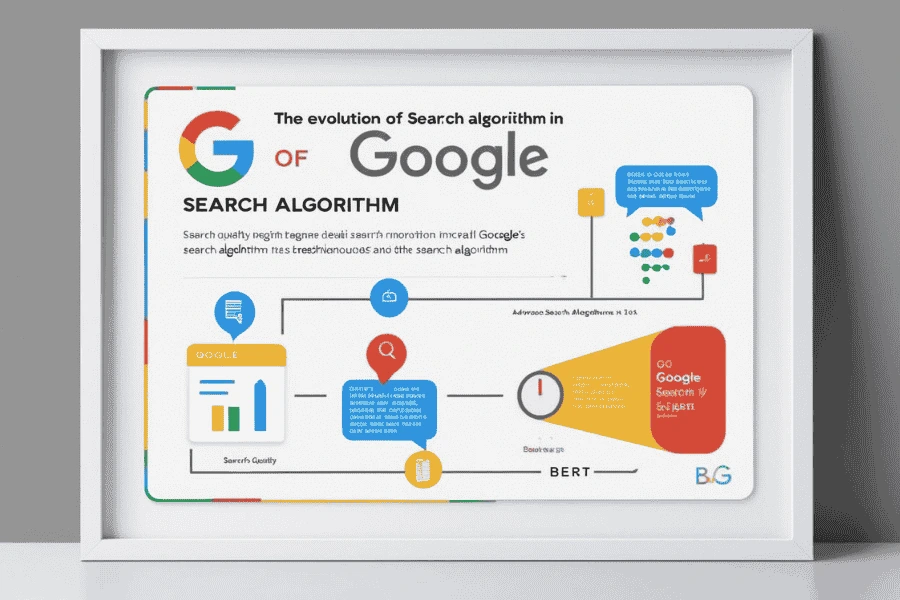Search Quality and BERT: NLP Breakthroughs in Google’s Algorithm Evolution
Introduction
Google’s ongoing mission to refine its search results has led to several major advancements. Among the most impactful is the introduction of BERT (Bidirectional Encoder Representations from Transformers), an advanced deep learning NLP model. BERT revolutionized how Google interprets user queries by focusing on context and intent especially for naturally phrased questions. This breakthrough illustrates the role of artificial intelligence in making search engines more intuitive and user-centric.

Understanding BERT
Launched by Google in 2018, BERT represents a significant leap in natural language understanding. Unlike traditional models that analyze text in a single direction, BERT reads text bidirectionally, assessing the full context around each word. This approach enables a much deeper comprehension of search queries. For instance, a query like “can you get medicine for someone at the pharmacy” is interpreted with greater clarity, recognizing that the user is asking about retrieving medication on behalf of someone else. This level of understanding exemplifies the evolution of Google’s language model and its ability to handle nuanced language.
Enhancing Search Quality
Since its rollout in 2019, BERT has increasingly shaped the search experience by enhancing Google’s ability to manage complex and long-tail queries. It goes beyond keyword matching by understanding sentence structure, grammar, and modifiers that affect meaning. This transformation boosts user satisfaction by delivering search results that are more accurate and aligned with user intent. BERT also supports the foundation of semantic search optimization, contributing to Google’s growing reliance on NLP algorithms and search quality signals.
SEO Shifts Post-BERT
The BERT SEO update has pushed the SEO industry to pivot from keyword-centric strategies to intent-driven content creation. Websites must now focus on producing comprehensive, naturally written content that answers real questions. Keyword stuffing has become ineffective, replaced by the need for conversational search optimization and natural language processing SEO. Those looking to improve rankings must embrace semantic SEO strategies, voice search SEO techniques, and user intent SEO practices. BERT has clearly redefined how search engines understand queries.
The Role of BERT in Today’s Search Landscape
BERT stands as a cornerstone in Google’s evolution toward AI-powered search. Its ability to process the subtleties of language across more than 70 languages has significantly widened the scope of global search improvements. It reflects Google’s commitment to enhancing user experience through search engine AI models and machine learning in SEO. BERT also supports Google’s AI language model infrastructure, deepening its role in contextual search optimization and how search engines understand language and intent.
Future Outlook and SEO Strategy
BERT has paved the way for more powerful AI models like MUM (Multitask Unified Model), which expands on BERT’s capabilities by understanding information across different languages and formats, including text and images. As we move into 2025, Google’s search understanding AI is expected to become even more personalized and dynamic. Future-proof SEO strategies must incorporate tools to optimize for NLP search, compare BERT vs MUM Google, and focus on writing content tailored for Google BERT. Adapting to algorithm update SEO strategies and keeping up with Google's ranking factors 2025 is now critical.
Conclusion
BERT isn’t just an update, it's a transformative shift in how search engines understand language. By emphasizing meaning over isolated keywords, BERT has elevated the standard for content relevance and user engagement. Content creators must now align their SEO in the age of AI with authentic, well-structured content that meets users’ expectations. As Google continues advancing its AI-driven technologies, understanding BERT’s impact on search rankings and how Google uses AI in search will be essential to maintaining online visibility and authority.
Active Events
Data Scientist Challenges One Should Avoid
Date: August 14, 2024 | 7:00 PM (IST)
7:00 PM (IST) - 8:10 PM (IST)
2753 people have registered
Your Data Science Career Game-Changing in 2024: Explore Trends and Opportunities
Date: Aug 08, 2025 | 7:00 PM (IST)
7:00 PM (IST) - 8:10 PM (IST)
2811 people have registered
Bootcamps
Data Science Bootcamp
- Duration:8 weeks
- Start Date:October 5, 2024
Full Stack Software Development Bootcamp
- Duration:8 weeks
- Start Date:October 5, 2024
